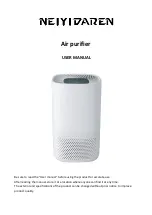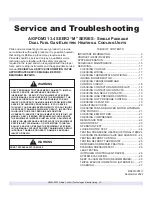
!
CAUTION!
Always use a wrench and nose key for connection of the coil to the pipes (fig. 29). If the solenoid valve is
installed, suitably insulate the valve body with insulating material (fig. 30).
Connect the water inlet and outlet pipes, observing the indications given on the side of the appliance. Correctly
insulate the water supply pipes to prevent dripping during the cooling mode of operation. An shutoff valve should
be inserted on the water supply pipe and a balancing valve on the outlet pipe. The valve body and balancing valve
should also be properly insulated to prevent dripping. It is the installer's responsibility to insulate properly and the
manufacturer cannot be held liable for any insulation work.
N.B.: It is always advisable to install the solenoid valve.
In the heating mode of operation the solenoid valve reduces consumption because upon reaching the set
temperature the circulation of water is stopped to avoid wasting energy (the fan coil would otherwise
continue to heat like a radiator, even with the motor at a standstill).
In the cooling mode of operation the solenoid valve stops the circulation of water when the set temperature
is reached, thus stopping the internal exchanger from continuing to condense water with possible undesirable
dripping onto the floor. It also reduces chiller operation with consequent energy saving.
CONNECTION TO THE WATER MAINS
CONDENSATE WATER DRAINAGE
The condensate drain pipe should slope downwards by at least 3 cm/m and should not have ascending or throttled
sections in order to ensure a regular flow of water. It is advisable for a trap to be fitted. The condensate drain pipe
should be connected to a rainwater drainage system. Do not use sewage systems to avoid possible odours in the
event of evaporation of the water in the trap. Upon completion of work, check that the condensate flows out properly
by pouring water into the tray (see figs. 31 and 32). The condensate water drainage system should be fabricated
in a workmanlike manner and should be periodically checked.
The manufacturer cannot be held liable for any damage caused by dripping in the absence of a solenoid
valve or of periodic maintenance of the drainage system.
WATER CONNECTIONS
Fig. 30
Fig. 29
Fig. 32
3 cm/m
Fig. 31
5 mm
3 cm/m
INSTALLATION
- OPERATING &
MAINTENANCE
MANU
A
L
Page 12
Summary of Contents for Comfair HC
Page 1: ...INSTALLATION OPERATING MAINTENANCE MANUAL Comfair HC HT ENGLISH MARCH 04 ...
Page 2: ......
Page 23: ......










































